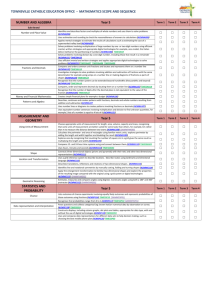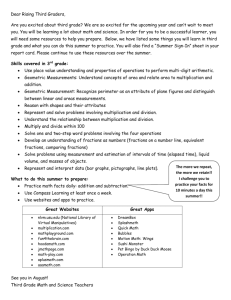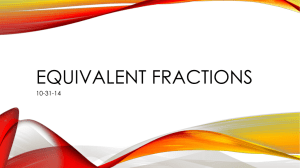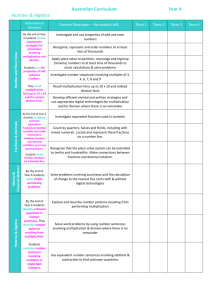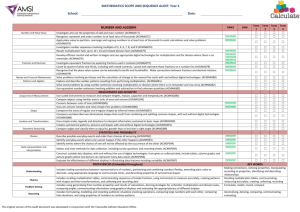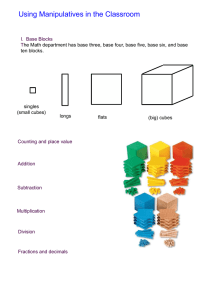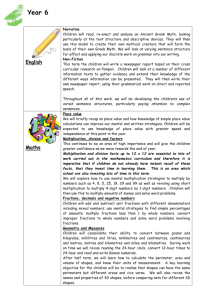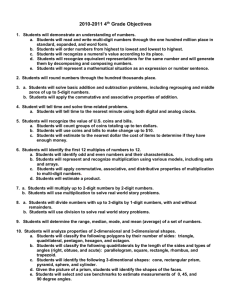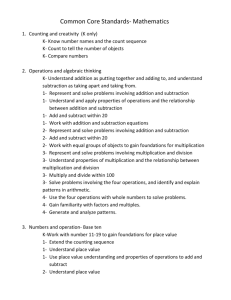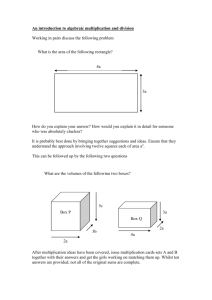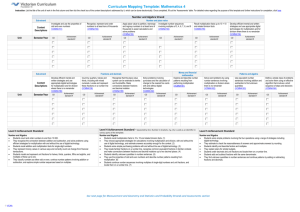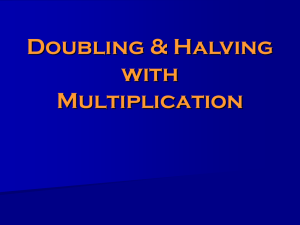townsville catholic education office
advertisement
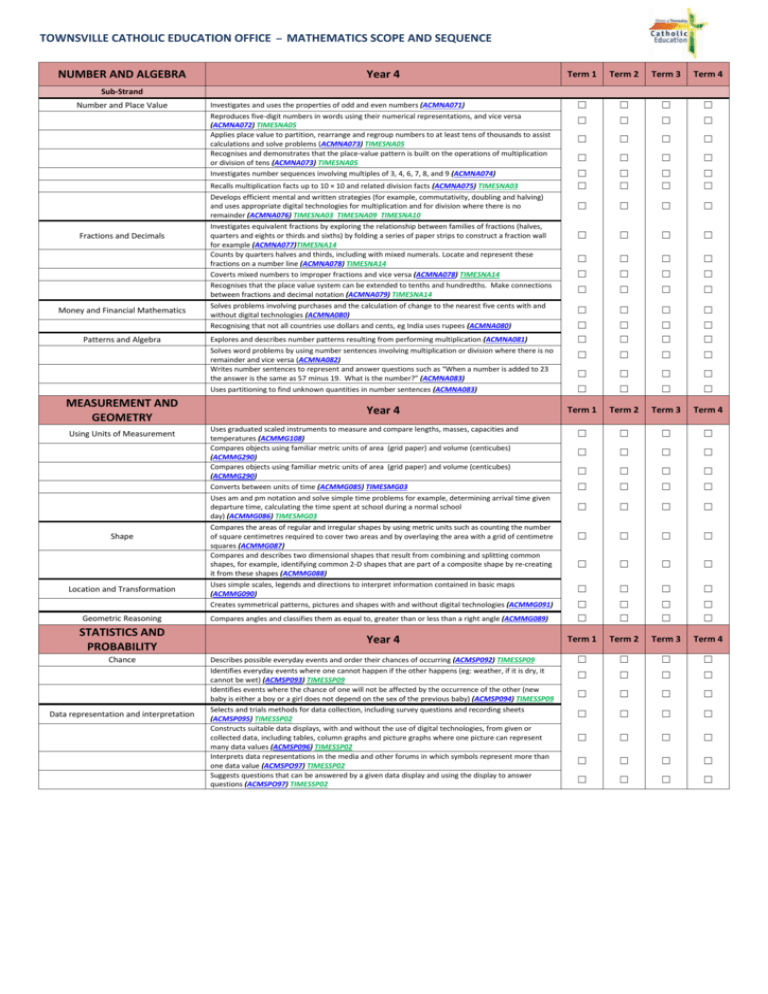
TOWNSVILLE CATHOLIC EDUCATION OFFICE – MATHEMATICS SCOPE AND SEQUENCE NUMBER AND ALGEBRA Year 4 Term 1 Term 2 Term 3 Term 4 ☐ ☐ ☐ ☐ ☐ ☐ ☐ ☐ ☐ ☐ ☐ ☐ ☐ ☐ ☐ ☐ ☐ ☐ ☐ ☐ ☐ ☐ ☐ ☐ ☐ ☐ ☐ ☐ ☐ ☐ ☐ ☐ ☐ ☐ ☐ ☐ ☐ ☐ ☐ ☐ ☐ ☐ ☐ ☐ ☐ ☐ ☐ ☐ ☐ ☐ ☐ ☐ ☐ ☐ ☐ ☐ ☐ ☐ ☐ ☐ ☐ ☐ ☐ ☐ ☐ ☐ ☐ ☐ Year 4 Term 1 Term 2 Term 3 Term 4 Uses graduated scaled instruments to measure and compare lengths, masses, capacities and temperatures (ACMMG108) Compares objects using familiar metric units of area (grid paper) and volume (centicubes) (ACMMG290) Compares objects using familiar metric units of area (grid paper) and volume (centicubes) (ACMMG290) Converts between units of time (ACMMG085) TIMESMG03 Uses am and pm notation and solve simple time problems for example, determining arrival time given departure time, calculating the time spent at school during a normal school day) (ACMMG086) TIMESMG03 Compares the areas of regular and irregular shapes by using metric units such as counting the number of square centimetres required to cover two areas and by overlaying the area with a grid of centimetre squares (ACMMG087) Compares and describes two dimensional shapes that result from combining and splitting common shapes, for example, identifying common 2-D shapes that are part of a composite shape by re-creating it from these shapes (ACMMG088) Uses simple scales, legends and directions to interpret information contained in basic maps (ACMMG090) Creates symmetrical patterns, pictures and shapes with and without digital technologies (ACMMG091) ☐ ☐ ☐ ☐ ☐ ☐ ☐ ☐ ☐ ☐ ☐ ☐ ☐ ☐ ☐ ☐ ☐ ☐ ☐ ☐ ☐ ☐ ☐ ☐ ☐ ☐ ☐ ☐ ☐ ☐ ☐ ☐ ☐ ☐ ☐ ☐ ☐ ☐ ☐ ☐ Year 4 Term 1 Term 2 Term 3 Term 4 Describes possible everyday events and order their chances of occurring (ACMSP092) TIMESSP09 Identifies everyday events where one cannot happen if the other happens (eg: weather, if it is dry, it cannot be wet) (ACMSP093) TIMESSP09 Identifies events where the chance of one will not be affected by the occurrence of the other (new baby is either a boy or a girl does not depend on the sex of the previous baby) (ACMSP094) TIMESSP09 Selects and trials methods for data collection, including survey questions and recording sheets (ACMSP095) TIMESSP02 Constructs suitable data displays, with and without the use of digital technologies, from given or collected data, including tables, column graphs and picture graphs where one picture can represent many data values (ACMSP096) TIMESSP02 Interprets data representations in the media and other forums in which symbols represent more than one data value (ACMSPO97) TIMESSP02 Suggests questions that can be answered by a given data display and using the display to answer questions (ACMSPO97) TIMESSP02 ☐ ☐ ☐ ☐ ☐ ☐ ☐ ☐ ☐ ☐ ☐ ☐ ☐ ☐ ☐ ☐ ☐ ☐ ☐ ☐ ☐ ☐ ☐ ☐ ☐ ☐ ☐ ☐ Sub-Strand Number and Place Value Fractions and Decimals Money and Financial Mathematics Patterns and Algebra MEASUREMENT AND GEOMETRY Using Units of Measurement Shape Location and Transformation Geometric Reasoning STATISTICS AND PROBABILITY Chance Data representation and interpretation Investigates and uses the properties of odd and even numbers (ACMNA071) Reproduces five-digit numbers in words using their numerical representations, and vice versa (ACMNA072) TIMESNA05 Applies place value to partition, rearrange and regroup numbers to at least tens of thousands to assist calculations and solve problems (ACMNA073) TIMESNA05 Recognises and demonstrates that the place-value pattern is built on the operations of multiplication or division of tens (ACMNA073) TIMESNA05 Investigates number sequences involving multiples of 3, 4, 6, 7, 8, and 9 (ACMNA074) Recalls multiplication facts up to 10 × 10 and related division facts (ACMNA075) TIMESNA03 Develops efficient mental and written strategies (for example, commutativity, doubling and halving) and uses appropriate digital technologies for multiplication and for division where there is no remainder (ACMNA076) TIMESNA03 TIMESNA09 TIMESNA10 Investigates equivalent fractions by exploring the relationship between families of fractions (halves, quarters and eights or thirds and sixths) by folding a series of paper strips to construct a fraction wall for example (ACMNA077)TIMESNA14 Counts by quarters halves and thirds, including with mixed numerals. Locate and represent these fractions on a number line (ACMNA078) TIMESNA14 Coverts mixed numbers to improper fractions and vice versa (ACMNA078) TIMESNA14 Recognises that the place value system can be extended to tenths and hundredths. Make connections between fractions and decimal notation (ACMNA079) TIMESNA14 Solves problems involving purchases and the calculation of change to the nearest five cents with and without digital technologies (ACMNA080) Recognising that not all countries use dollars and cents, eg India uses rupees (ACMNA080) Explores and describes number patterns resulting from performing multiplication (ACMNA081) Solves word problems by using number sentences involving multiplication or division where there is no remainder and vice versa (ACMNA082) Writes number sentences to represent and answer questions such as “When a number is added to 23 the answer is the same as 57 minus 19. What is the number?” (ACMNA083) Uses partitioning to find unknown quantities in number sentences (ACMNA083) Compares angles and classifies them as equal to, greater than or less than a right angle (ACMMG089)
